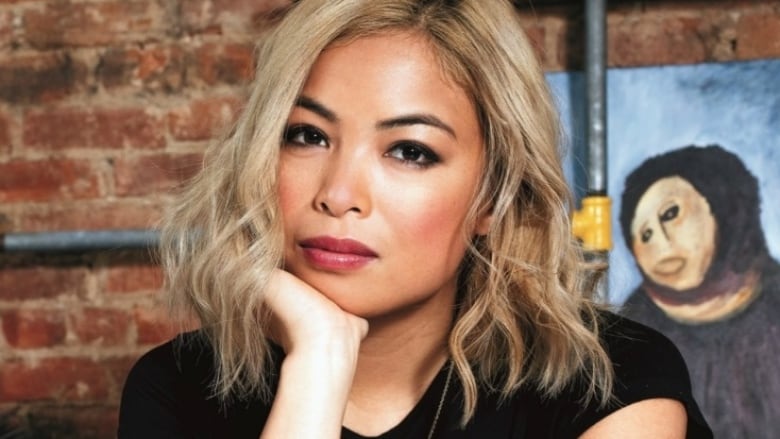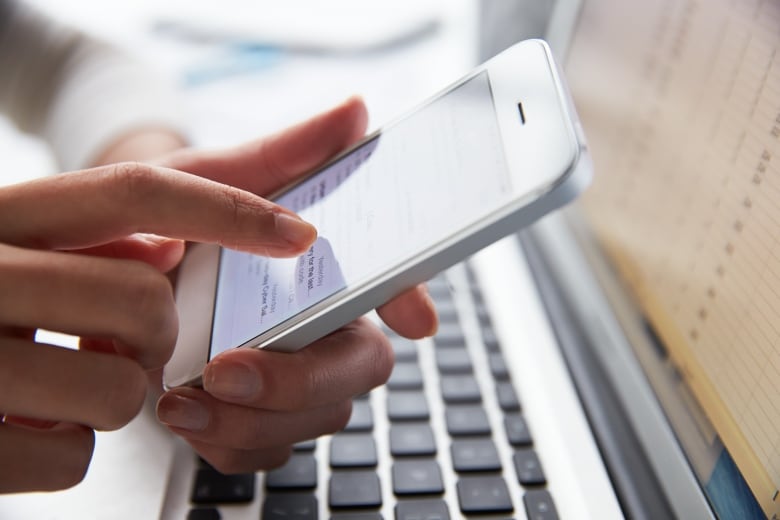This woman hid her pregnancy from her phone and the apps trying to sell her stuff
Jia Tolentino avoided buying or searching online for anything to do with babies


When writer Jia Tolentino found out she was pregnant, she decided to hide the news.
Not from the people in her life,but from her cellphoneand the apps that might share the news with companies trying to sell her stuff.
"When ad companies know something about you, you know immediately, right?" said Tolentino, who wrote about her experiment for The New Yorker.
"Everyone has had the experience of looking at something online and then having it follow you around your own internet for three weeks."
Tolentino talked to The Current's Matt Galloway how her experiment went, and whether you too can try to escape the surveillance economy. Here is part of their conversation.
Why did you want to go on this experiment of hiding your pregnancy online?
Something that I think about a lot is that every time we get on our phones, every time we look at something on our computer, there is this vast hidden network of companies you know, data brokers, ad companies that are tracking our every move, and are buying and selling and trading information on who we are and what we might buy and what our politics might be and what other companies might nudge us to do. And this is a much bigger economy than I think people realize.
The writer Shoshana Zuboff calls this surveillance capitalism...these industries that take the kind of raw material of human experience and life, and want and need [to] turn it into, you know, these vast profit centres for all these companies.
I wanted to see if I could just withhold something important from it for a little bit.
How did you go about hiding your pregnancy from the online world?
I set some rules. I told myself, "OK, no googling anything related to pregnancy, no buying anything related to babies."And the same went for my husband because our IP addresses and our unique digital identifiers that all of these ad companies use were linked.
So we just abstained from asking Google thingsand from buying things, basically.

How difficult is that to do when a baby is on the way?
It was my second pregnancy, which made it a lot easier. I don't know if I would have been able to do it with my first.
But also, that alone was a really useful existential experiment to say, "What would it be like to have a question and not immediately ask Google?"
[In your essay, you mention]this report showing that a single pregnant woman is as valuable to data brokers as knowing the age, gender and location of more than 200 non-pregnant people ... that's extraordinary to think about.
Yeah. There is an enormous amount of data being aggregated about us. And it's also not always accurate that almost makes it worse.
You ask any woman that has gone through infertility, or who has miscarried, and still gets targeted with ads that think that they are an expectant mother for months.
And I think it also speaks to the construction of what being a parent, a new parent, is. So much of that socially is, "Oh, here's all this new stuff you have to get."You prepare by buying and buying and buying.
You talk about the technology that exists now. Baby monitors, nanny camsthat are hidden away in a teddy bear. These smart socksthat babies sleep in. What is the connection between those devices and what Shoshana Zuboff called surveillance capitalism?
There is this growing idea, I think, in contemporary life that tracking everything about our lives our steps, the people that walk by our front doors that tracking and surveilling will keep us safe and will allow us to improve our lives.
It's part of the thing that pushes us to accept the ubiquity of surveillance on our phones and in other aspects of life, I think. And one of the ways that this gets incepted into, I think, our worldview is when people become parents.
You are presented with this plethora of sort of smart devices that surveil your baby, ostensibly with the idea that this will make them safereven though there's little to no data on any of these devices that they improvemedical or otherwise outcomes for babies at all.
But of course you'd want to buy something that will keep an eye on your baby while you're sleeping, and use AI to detect signs of distress and beep your phone to wake you up.
Of course you'd want that because, you know, what is more urgent and intimate than the desire to keep a baby safe?And who's more vulnerable than a two week old, right? I understand so completely why these devices are so attractive, but they don't keep people any safer.
I think that they create the anxieties that they say that they're going to soothe.
And so [the ad companies]never found out?
I do think I managed to hide it from data brokers until five months, six months, which is when I called a privacy expert and said, "Did I actually do this?"And she said, "I think you might have."
And I was like,"Great, I succeeded."I immediately ended the phone call, bought maternity pants and ads for baby stuff took over my feeds for the remainder of my pregnancy.
Having gone through this, what is the lesson that you would take away from what you pulled off?
I think in one way it was like, "Well, I hid this one little thing, but I'm still being tracked about everything else."
In some way there was no true, enormous takeaway that I could somehow change the grip of surveillance economy on our existence.
Audio produced by Ines Colabrese














_(720p).jpg)


 OFFICIAL HD MUSIC VIDEO.jpg)
.jpg)



























































































